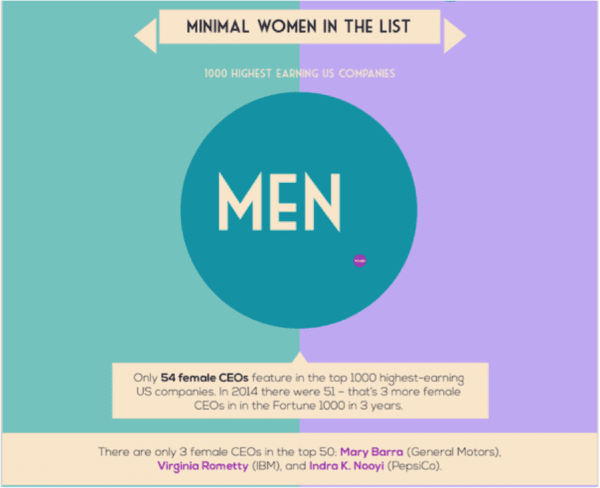In 2015, newly-elected Prime Minister Justin Trudeau named 15 women and 15 men to his cabinet. Unbelievably, the media questioned him as to why, and his simple response “Because it’s 2015”, made international headlines and lit up social media. Trudeau’s act of equality set a precedent but also echoed the promise of a new deal for Canadian women.
Along a similarly positive vein, I recently blogged about Chimananda Ngozi Adichie’s feminist manifesto as a barometer of what it means to live with dignity and grace. Adichie’s 15-point doctrine applies universally to all, irrelevant of one’s gender. As I commented on my blog page, “The real joy for me is a younger woman has picked up the feminist torch and is willingly carrying it forward, which means we still can carry hope for equality in our lifetime.”
Don’t let the rosy picture above delude you into thinking we are anywhere near the goal of gender equity. Instead, let the data from two distinctly different social strata inform your assessment. Consider the case of female sex trafficking in Canada —
Approximately 70 percent of all Canadian cases involve domestic sex trafficking.
This is a growing public issue and largely a domestic crime. Nearly 90% of victims
are female and as young as 13 years old. Research shows that 42% of victims were
trafficked before the age of 18 years. Benjamin Perrin, Invisible Chains: Canada’s
Underground World of Human Trafficking
The invisible chains [Perrin] seeks to break are invisible only because we choose not
to see them. He wants us to open our eyes to the modern-day slavery all around us —
and his book is just the call to action that Canada needs. Julian Sher
On the other end of the socio-economic continuum, women are still significantly underrepresented in business culture, which is seen as traditionally slow to shift. This is hardly an excuse for the current statistic where “only 54 female CEOs feature in the top 1000 US companies” (see infographic below).

What further insults women, and society in general, is the comment “Women still have limited representation in the Fortune 1000, but it looks like that’s changing, albeit slowly” (Talentful co-Founder Phil Blaydes). How does an increase of 3 female CEOs (51 in 2014), qualify as a “sign of slow improvement?” A change of 3 has no statistical significance from a population of 1000 nor does it indicate a trend.
Inherently, a cultural shift needs to be adopted within organisations that reverses
gender stereotypes. Those companies that champion diversity are more likely to
flourish in an era where innovation is key to survival. Nick Ismail, Information
Age
Ismail’s comment may be wishful thinking but is also naïve in light of emerging data on female sex trafficking — Canada’s Criminal Intelligence Service estimates domestic sex traffickers earn an average of $280,000 annually from every victim under their control. Sex trafficking appears to be a financially flourishing business. Although sex trafficking and underrepresentation of female CEOs have a common denominator — disenfranchisement of women — I very much doubt business organizations will lead in eradicating gender disparity. This deeply-rooted fault exists in the psyche of every society around the globe, and will require each of us to express our personal outrage at its presence. Because it’s 2017, let your outrage be heard and …
Never forget that you are one of a kind. Never forget that if there weren’t any need
for you in all your uniqueness to be on this earth, you wouldn’t be here in the first
place. And never forget, no matter how overwhelming life’s challenges and problems
seem to be, one person can make a difference in the world. In fact, it is always because
of one person that all changes that matter in the world come about. So be that one
person. Buckminister Fuller
For more on being the change you wish to see in the world, click here.




